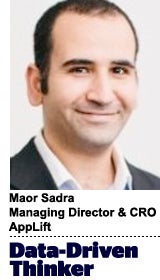 “Data-Driven Thinking” is written by members of the media community and contains fresh ideas on the digital revolution in media.
“Data-Driven Thinking” is written by members of the media community and contains fresh ideas on the digital revolution in media.
Today’s column is written by Maor Sadra, managing director and chief revenue officer at AppLift.
Organic downloads rarely happen. With more than 2 million unique apps in Apple’s App Store and 3.8 million in Google’s Play store, the odds of someone stumbling upon an app and downloading it “just because” are slim to none. Almost all app downloads are a result of marketing.
Yet, many mobile attribution companies warn marketers to be careful that paid media isn’t stealing their organic downloads. Truth be told, that rarely happens. So-called organic downloads are usually the result of unattributed marketing efforts.
When I was a marketer, I loved it when my “organics” were up. I knew I was getting free conversions because my paid marketing efforts weren’t being attributed correctly, probably because someone was using the wrong attribution link.
In Max Barry’s book “Syrup,” which paints a satirical picture of the world of Coca-Cola, the protagonist describes the secret recipe for Coke as 90% marketing. I agree. And that’s as true for apps as it is for soda.
The average age of the apps on the US top-10 list of highest-grossing apps is five years. New apps rarely penetrate this list, unless they have a crazy hyped IP like Pokémon, Disney or Star Wars.
For websites, the average age of top-performing sites per Alexa’s list is 18 years. The giants, including Google, YouTube, Facebook, Amazon and Reddit, have settled. If a site made it big, it is because of effective marketing during the early competitive days of the internet.
In the past, people may have discovered an app via organic searches in the app stores, but those days are gone since both Apple and Google prioritize paid search results via Apple Search Ads or Google UAC. Plus, the app stores’ search functionalities aren’t nearly as impressive as the desktop or Google app search experience.
Type “actor in Game of Thrones who fought the Mountain” on google.com and you get your answer in the first hit (Pedro Pascal, in case you are curious). Search “actor names” in the Apple App Store and you don’t even get IMDB. If you want to make sure your app shows up in certain keyword searches, you need to pay for it.
Getting an app featured on the app store for a few days will boost downloads, but the act of getting it featured is a marketing endeavor. The partner management team at Apple isn’t choosing apps out of nowhere. App developers and/or their marketing teams are reaching out and pitching them to be featured.
Sure, it is possible someone can tell a friend to download an app, but word of mouth isn’t driving downloads at scale for most app developers. Plus, social sharing can be attributed back to the original paid marketing tactic that resulted in the referring friend’s download. If 30 out of every 100 users share an app with their friends on Facebook, that can be tracked. You can also take steps to encourage it, as marketers commonly do by offering users incentives to share, such as discounts for themselves and their friends.
More than half of users download zero apps per month. The apps that earn a place on a user’s mobile device are working for it. Marketers should worry less about stealing organic downloads and focus more on correctly attributing every download so they can make better advertising decisions. If they notice a spike in organic downloads, they should ask, “Why aren’t I attributing these installs? Where did they come from?” People do not magically decide to choose an app over the millions of others. The magic is marketing.
Coca-Cola spends a billion a year on advertising. If it stopped today, its sales would not decline tomorrow, but eventually they would. Does Coca-Cola know how much of its sales comes from each and every marketing effort? Probably not, but it would love to.
App marketers have that luxury. The purpose of attribution companies is to attribute downloads. Marketers should take steps to understand their marketing so they can compete with the Coca-Colas or, more aptly, the Candy Crushes of the world.
Follow AppLift (@AppLift) and AdExchanger (@adexchanger) on Twitter.












